by Marcus Boston Jr. | Apr 26, 2023
Youth shows and fairs provide a valuable opportunity for young people to develop a wide range of life skills. From responsibility and communication to planning and organization, these events offer a unique learning experience that can help young people build important skills for success in all areas of life.
Can a youth’s participation in County fairs and Shows help to develop them into responsible adult? The answer is yes! The Florida 4-H Program seeks to be inclusive to all youth by using a variety of vehicles to teach youth life skills in traditional and non-traditional settings. A recent article in The Journal of Extension by Oregon State professionals found that “having fun” “spending time with friends” and “teamwork” were the highest-rated motivators for youth that participated in fairs.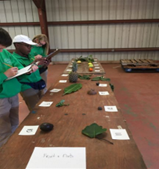
The study also revealed that participation in fairs through 4-H had a significant positive effect on participants’ levels of caring, contribution, and character. These characteristics are also part of the Essential Elements of 4-H that youth experience by being in an active 4-H program throughout the year. Those elements are Belonging, Independence, Generosity, and Mastery.
One of the most important skills that youth learn through participation in youth shows and fairs is responsibility. Whether they are caring for animals, plants, or other projects, youth must take on the responsibility of ensuring that their projects are healthy, well-cared for, and ready to be presented to judges and visitors.
 Communication is another key skill that youth develop through participation in youth shows and fairs. Through active participation youth learn the ability to articulate complex ideas, listen actively, and respond thoughtfully to questions and feedback.
Communication is another key skill that youth develop through participation in youth shows and fairs. Through active participation youth learn the ability to articulate complex ideas, listen actively, and respond thoughtfully to questions and feedback.
In addition to these skills, youth shows, and fairs also emphasize important values such as sportsmanship and fair play. Participants are encouraged to respect their competitors, accept both victories and defeats graciously, and uphold the highest standards of ethical behavior. This helps young people develop important social skills, including the ability to work collaboratively with others and build positive relationships.
Finally, participation in youth shows and fairs can help young people develop resilience and perseverance in the face of challenges and setbacks. These events can be competitive and stressful, but they also offer opportunities for young people to learn from failures, bounce back from disappointments, and remain motivated to achieve their goals.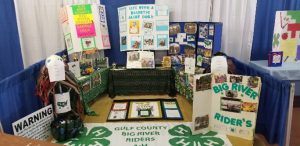
A few of the Florida 4-H Shows and Fairs are as follows:
-
- State 4-H Dairy Show Okeechobee March
- 4-H Chick Chain Show Chipley April
- Area North Horse Show Green Cove Springs May
- North Florida Fair Tallahassee November
*For additional opportunities to participate in 4-H Shows and fairs please contact your local 4-H office.
In conclusion, participation in youth shows and fairs can offer a unique and valuable learning experience for young people. By developing important skills such as responsibility, communication, planning, and organization, as well as important values such as sportsmanship and fair play, youth can build the foundation for success in all areas of life.
References:
More information on this study can be obtained by visiting the Journal of Extension at www.joe.org and viewing volume 45, number 6.(Arnold, Meinhold, Skubinna, and Asthton)
by Marcus Boston Jr. | Apr 13, 2023
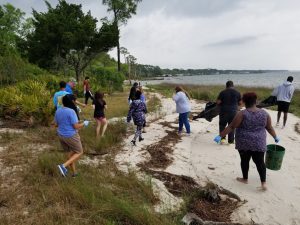 Life skills for youth are defined as a set of abilities and competencies that enable young people to successfully navigate their daily lives and achieve their goals. These skills are essential for personal and professional development and help “prepare youth to be responsible citizens and productive members of the workforce.” Florida 4-H provides many opportunities for young people to obtain life skills through project work, community and afterschool clubs, workshops, and leadership programs.
Life skills for youth are defined as a set of abilities and competencies that enable young people to successfully navigate their daily lives and achieve their goals. These skills are essential for personal and professional development and help “prepare youth to be responsible citizens and productive members of the workforce.” Florida 4-H provides many opportunities for young people to obtain life skills through project work, community and afterschool clubs, workshops, and leadership programs.
As a state-wide organization, Florida 4-H prioritizes the development of communication, higher-order thinking, and appreciation of differences. These three life skills are infused throughout our educational activities and programs because they are essential workforce skills. Below are a few examples of local programs that focus on helping youth develop life skills:
- Communication: 4-H provides opportunities for youth to develop their communication skills through the Florida 4-H Public Speaking Contest, demonstrations, and presentations at County/District and 4-H University. These activities help youth learn how to articulate their ideas clearly and confidently.
- Higher Order Thinking: this includes both decision-making and problem-solving.
- Decision-Making: 4-H offers various programs, such as judging contests at fairs, 4-H event planning committees (district/state council), and club activities that help youth develop their decision-making skills. These activities help youth learn how to make informed decisions and evaluate the outcomes of their choices.
- Problem-Solving: 4-H offers various programs, such as STEM projects and engineering challenges, that help youth develop problem-solving skills. These activities encourage youth to think creatively and find innovative solutions to complex problems.
- Appreciation of Differences– 4-H helps youth learn how to respect and communicate with people who might be different from themselves. Many of our programs offer opportunities for youth to meet new people and explore different cultures. We also help youth learn how to address conflict in a positive way through civil discourse. Older youth can participate in exchange programs with 4-Hers from other states and countries (4-H is in all 50 states and 32 other countries!).
- Teamwork: Through 4-H club projects, counselor training, and community service activities, youth learn how to work collaboratively with others towards a common goal, which helps them develop important teamwork skills.
- Responsibility: 4-H club projects and community service activities encourage youth to take responsibility for their actions and to learn the importance of following through on commitments.
- Leadership Development: 4-H offers various programs, such as officer training, public speaking, county/district councils, and community service projects, that help youth develop their leadership skills.
- Self-Confidence: 4-H programs provide a safe and supportive environment where youth can build their self-confidence through public speaking, leadership roles, and community service activities.
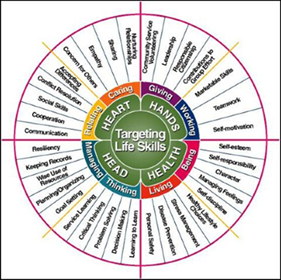
- Service Learning: Through 4-H club work, obtaining a Florida 4-H Community Pride Grant, and active membership on county/district councils, youth members take part in projects and experiences that help them how to become active participants in the communities and apply their experiences to real-life situations.
These are not the only life skills youth in Florida can learn and practice through 4-H- but they are part of almost every program we offer. These are examples of the priority life skills that Florida 4-H promotes among youth, with a focus on cognitive development, interpersonal skills, leadership, civic engagement, and practical skills. Florida 4-H aims to provide a comprehensive youth development program that equips young people with the skills they need to succeed in their personal lives, careers, and communities. Active involvement in 4-H will help members to connect life skills obtained through their 4-H involvement to real-life experiences. For more information on these youth leadership opportunities please contact your local 4-H office.
If you would like to help Florida 4-H teach life skills, or get your child involved in our program, reach out to your local UF/IFAS County Extension Office. There is an office in every county in Florida. Spring is a great time to get involved, because 4-H offers several summer programs for youth to develop life skills!
References:
Marilyn N. Norman and Joy C. Jordan.2018.Targeting Life Skills. EDIS document #4HSFS101.9
Hendricks, P.(1988). Developing Youth Curriculum Using The targeting Life Skills Model
Michigan State Extension. 2016. 4-H Head Life Skill Sheets.(4-H1679)
by Allison Leo | Nov 29, 2021
4-H Day at the North Florida Fair celebrated a triumphant return on Saturday November 13. This annual event in Tallahassee took a hiatus in 2020 due to the pandemic but returned in full force this past Saturday. 4-H Day at the Fair is an event that connects 4-H members and their families with each other from across North Florida. The fair was filled with a sea of green as eager 4-H members joined together to compete in 4-H contests, enjoy fair rides, and sample delicious fair food. The North Florida Fair provides 4-H members and volunteers with special deals on rides for the day. 4-H Member Arvaneh G. shared that her favorite part was “all the rides, especially the Himalaya, and the bounce houses”.
Before the rides and fair are open, 4-H Day Starts in the early morning as members compete in a variety of contests. This year, those contests were the STEM Challenge, Consumer Choices, Agriculture Judging, Horticulture Identification, and Wildlife Ecology. Members put their life skills developed through 4-H to work by displaying critical thinking, teamwork, and problem solving during the contests. A total of 116 youth competed in the contests during 4-H Day at the North Florida Fair this year. Participants had the option to compete as individuals or on a team in each contest. Senior 4-H Member Sophia L. shared “it was really great to see the Wildlife Ecology Contest return, we had such a great turn out with a lot of variety in ages”. Sophia expressed how she was excited for the contest to be back, adding “there is something about that friendly competition atmosphere this is really motivating, seeing so many people that are all passionate about similar things”.
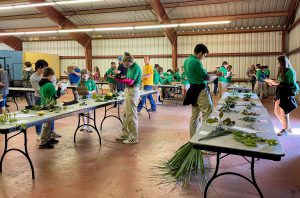
4-H members participating in the Horticulture ID Contest
STEM Contest
The topic of the STEM Challenge Contest this year involved building a roller coaster using the engineer design process. All youth competing in this contest were placed on a team based on their age division. A limited amount of materials were provided and the teams worked together to create a roller coaster that would carry a marble from the top of the coaster to the bottom with at least two loops and one curve. The teams were judged on creativity, communication, and teamwork. The final designs were put on display in the 4-H Building for the remainder of the fair.
Consumer Choices
The Consumer Choices Contest measured the ability of youth to be smart shoppers. The item categories this year were cell phone plans, ground transportation selection, wireless portable speakers, and smoothies. 4-H members had the opportunity to compete in this contest as an individual or on a team. Each individual or team was provided with a “situation card”. Based on the criteria provided in the card, members were asked to review four different choices of each item and rank them from best to worst based on the criteria. After they were finished ranking, they would have to justify their selection through an “oral reasoning” section.
Agriculture Judging
During the Agriculture Judging Contest, individuals and teams were tested on their knowledge of beef, poultry, hay, corn, soybean, and oats. Youth competed both as individuals and on teams with their age division. Agriculture judging consists of analyzing a product (i.e. cattle, soybeans) and measuring it against a standard. Members were asked to analyze four different choices of each item and rank them from best to worst based on the standard.
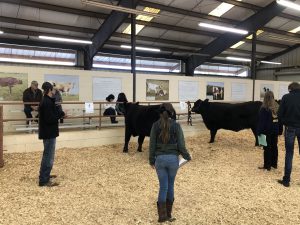
4-H members competing in the Agriculture Judging Contest
Horticulture Identification
The Horticulture Identification Contest tested the ability of members to identify over 60 horticulture specimens. The items were divided into four separate categories. Those categories were ornamentals, fruits & vegetables, flowers, and foliage. The specimens were laid out on tables, each bearing a number that corresponds to a scoresheet, that listed over 100 plant names. This contest replicates the state 4-H Horticulture Contest held each year in June.
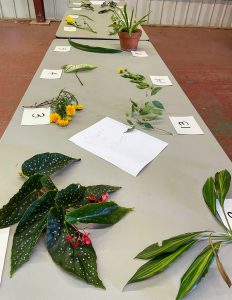
Plant specimens in the Horticulture ID Contest
Wildlife Ecology Contest
During the Wildlife Ecology Contest, members were tested on their knowledge of Florida trees, mammals, birds, reptiles, and amphibians. They identified the various items through pictures, physical specimens, and audio sounds. 4-H Member Joycelyn G. joined 4-H this past year and had the opportunity to participate in two contests this year. When asked what her favorite thing about 4-H Day at the Fair was, she answered “I loved the rides and I loved the competition. Thank you very much for having a special spot for me. I really loved the fair. It was the best day ever!”
4-H Exhibits & Club Booth Building
In addition to contests, members had the opportunity to view exhibits and club booths in the 4-H Building at the fair. 4-H members from across the panhandle submit exhibits that express what they have learned through their 4-H experience. Premiums and special merit awards are issued to members whose exhibits demonstrate outstanding efforts and quality in each class. Club booths are constructed by club members and volunteers. The club booths showcase the various 4-H clubs in North Florida.
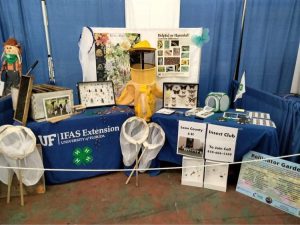
Leon County 4-H Insect Club created their booth to highlight the importance of pollinators

 Communication is another key skill that youth develop through participation in youth shows and fairs. Through active participation youth learn the ability to articulate complex ideas, listen actively, and respond thoughtfully to questions and feedback.
Communication is another key skill that youth develop through participation in youth shows and fairs. Through active participation youth learn the ability to articulate complex ideas, listen actively, and respond thoughtfully to questions and feedback.






